 |
|
Tuesday,
6 June:
Delegates
to the informal meetings preceding SB-12 met to discuss: policies
and measures; guidelines on Protocol Articles 5 (methodological
issues), 7 (communication of information) and 8 (review of information);
cross-cutting issues; land use, land-use change and forestry; and
the mechanisms.
|
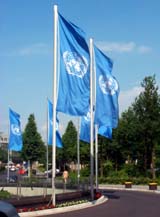 |
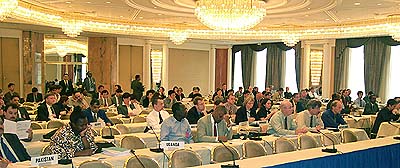 Informal
meeting on Policies and Measures Informal
meeting on Policies and Measures
Chair Dovland summarized the outcome
of the FCCC workshop on policies and measures (P&Ms) held during
April in Copenhagen, and asked delegates for suggestions on future
work. While most delegates underlined the continuing value of
information exchange, there was concern at the heavy workload
prior to COP-6.
|
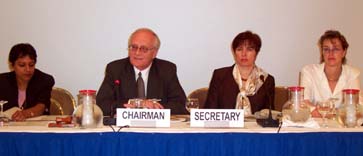
|
Harald
Dovland (Norway) [second from the left],
Chair of the Subsidiary Body for Scientific and Technological
Advice (SBSTA)
|
|
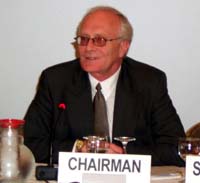 |
Informal meeting
on cross-cutting issues
Chair Dovland said this meeting
was aimed at facilitating coherence and eliminating duplication
of work among the various issues under negotiation. He noted linkages
between the work on mechanisms, compliance and Articles 5, 7 and
8, and suggested grouping these cross-cutting issues in seven
areas: supplementary information relating to the mechanisms; the
review of mechanisms-related activities; the relationship between
the adjustment and compliance procedures; the relationship between
the classification of problems and the screening procedure; implementation
issues; and criteria for mechanisms participation. He then listed
14 specific questions related to these cross-cutting issues and
identified which of the three contact groups should take the lead
role in responding to each of these questions. He noted that further
questions could be added to this list, and that there were linkages
between other issues under negotiation, such as the potential
linkages between work on P&Ms and FCCC Article 4.8 and 4.9 and
Protocol Article 3.14.
|
| Harald Dovland (Norway)
[above left], Chair of the Subsidiary Body for Scientific
and Technological Advice (SBSTA) and John Ashe (Antigua
& Barbuda) [above right], Chair of the Subsidiary Body for
Implementation (SBI) |
|
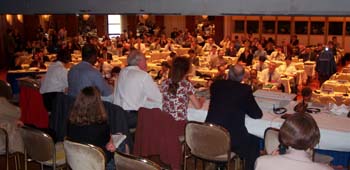
| Above and right: views from
behind the podium during the cross-cutting issues discussion |
|
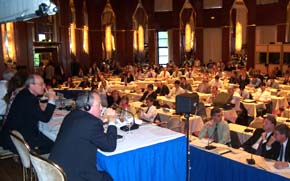 |
| Hard at work at the back of
the room: Michal Zammit Cutajar, Executive Secretary
of the UNFCCC [on the left] looks over
his documents while members of the ENB behind him listen to
Chair Dovland's remarks |
|
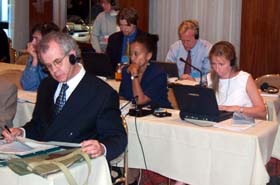 |
|
Mechanisms Pursuant
to Articles 6, 12 and 17 of the Protocol - Industry and NGO
|
Industry and environmental
NGOs' positions: In an evening session on business and NGO perspectives
on the mechanisms, representatives from the business community,
including the International Chamber of Commerce and the International
Climate Change Partnership, recommended, inter alia, that COP-6:
agree to clear definitions on fungibility and tradeability; eschew
quantitative restrictions in the mechanisms; provide clarity on
the proposed institutional controls for CDM; create a strong and
fair compliance system; and approve mechanisms for fast-track CDM
crediting. Most representatives expressed preference for seller
liability.
| From left to right:
Nick Campbell, International Chamber of Commerce (ICC);
Jonathan Grant, International Petroleum Industry Environmental
Conservation Association (IPIECA); John Novak, Edison
Electric Institute (EEI); Tom Jacob, International Climate
Change Partnership (ICCP); Paul Metz, European Business
Council for a Sustainable Energy Future (BCSE), Norine Kennedy,
ICC. |
The Climate Action Network (CAN), representing
the NGOs, said Annex-I participation in the mechanisms should hinge
on their ability to monitor and report emissions to a given standard
and track changes to AAUs. On liability, CAN supported a hybrid buyer-seller
liability ensuring environmental effectiveness and capturing the market's
power to enhance compliance. On CDM, CAN said it must: encourage the
development of markets for clean energy technologies in the South;
support local, regional and national development priorities; have
minimum overall environmental impacts; and not undermine Annex I domestic
action. CAN also suggested measures to enhance public participation
in the CDM Project Cycle. |
| Nick Campbell,
ICC; Jonathan Grant, IPIECA; John Novak, EEI
|
|
|
Tom Jacob,
ICCP; Paul Metz, BCSE, Norine Kennedy, ICC.
|
|
|
Miscellaneous
|
|
|
| <sb12_participants@hotmail.com>
login in... |
|
|
In the corridors
Some participants felt the session on
cross-cutting issues represented a barometer for the meeting so
far, which seems to have started constructively. A number of participants
suggested that Wednesday's briefing on the IPCC's Special Report
on LULUCF could result in the most lively session of the meeting
to date.
|
|